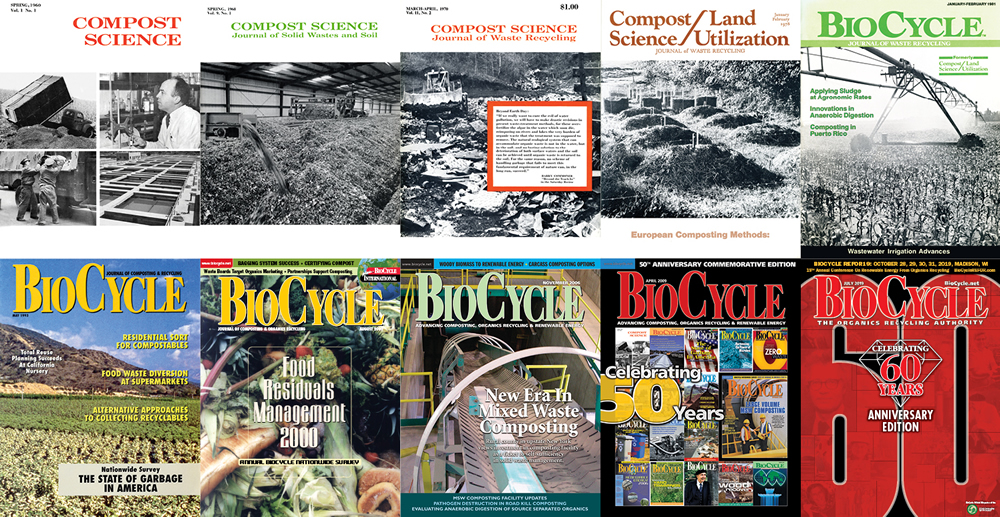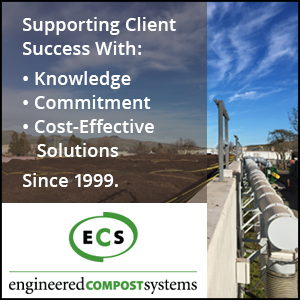Reading Editorials written by BioCycle founder Jerry Goldstein over a five decade period reveals how so much of what is taken for granted today came to be.
Nora Goldstein
BioCycle July 2019
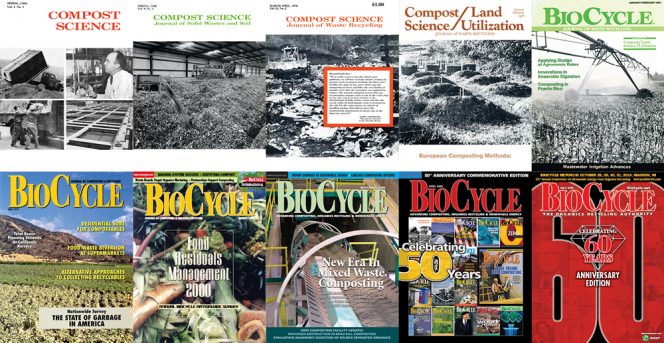
BioCycle’s founder, Jerome (Jerry) Goldstein, began his Editorial in November-December 1984, “The Year Before The 25th,” as follows: “This year just completed has been the year before the 25th anniversary of this publication. Though it originally was launched with a different title back in the spring of 1960, its purpose has been constant: To communicate ideas, methods and research that lead to positive benefits instead of negative pollutants. Our goal has been to show how biological methods and recycling strategies provide environmental and economical ways to reclaim nutrients and reduce the waste stream. And always the message is best remembered through the efforts of the people behind the projects and the research.
“We’ve seen many shifts in attitudes and activities that have affected the municipal, industrial and agricultural waste stream in the past 24 years. But as we move into the 25th year, it’s with a great deal of confidence and optimism that together we’ll be making tremendous progress in 1985. And for the coming 25 years, who knows, but we may well eliminate waste as a household word!”
Well, 50 years from our founding have come and gone, and at 60 years in, waste has not been eliminated as a household word. But what has been eliminated is any doubt that we know how — and are fully capable of — getting rid of waste as a household word. Because of the sheer volume of past issues of BioCycle, we approached looking back for this 60th Anniversary Edition in 5-year increments, starting in 1960, and ending in 2015. It was revealing that from 2000 to 2015, editorial content was more about accelerating implementation, adoption of best practices (i.e., tried and true must do’s), and tweaking technologies. There also was a reemergence of state and local policies to stimulate organics recycling and, more recently, food recovery.
So can we get rid of waste as a household word? Yes. Will it happen soon? It could. What will it take? For those who can make a difference to actually make that difference happen, from global Fortune 500 companies to the small innovators and entrepreneurs, from the halls of Congress and Parliaments to the town and county councils. From the grass roots to the green roofs and beyond.
In an Editorial in the beginning of 1978, “Turning the Corner with Compost Science” [BioCycle’s original name], Jerry wrote that composting has made “the transition from an idea for the future to an idea whose time has come. As the leading publication in this vital area of waste management — the journal which has been credited with ‘moving the world of composting from small backyard plots to huge metropolitan waste treatment agencies’ — COMPOST SCIENCE is also in the midst of a major transition. We feel it’s no longer enough to be an authoritative reference publication; now it’s time to be an action publication as well — one that makes a great impact upon waste management decisions throughout the nation and the world.
“…. It’s not enough for the able decision maker in waste management — whether in village, city, industry, government office or on the farm — to be content with technologies that add up to disposal. Being informed about composting and all aspects of land utilization of organic wastes is absolutely essential. We aim to satisfy that need as forcefully as we can. We thank you for being with us as we turn the corner together.”
Yes, thank you for being on this journey with us. We’ve selected a variety of what we are calling “JG Gems” that illuminate where we’ve been — and frame where we need to go.
As True Today As It Was Back In …
Autumn, 1962: Garbage To Gold — And Back Again
Favorable publicity about the advantages of municipal composting is always welcome, but it can be overdone. For example, the October 1962 issue of The Reader’s Digest started their article, “Good Soil from Old Garbage,” as follows: “At San Fernando, California, a part of Greater Los Angeles, a new kind of factory is converting garbage into gold.”
As if not to be outdone, the Los Angeles Herald-Examiner headlined: “They Change Trash into Cash” and then proceeded to give a description of the San Fernando plant.
Now this type of reporting does stimulate interest in the value of conserving wastes, but it also does tend to put too much emphasis on the gold, and not enough on the garbage. Once you do that, you’re in trouble.
Refuse disposal is a municipal responsibility. Disposal costs are continually rising, as suitable landfill sites disappear and dumps are outlawed. Composting is a practical and economical treatment method. It doesn’t need embellishment with claims of gold, nor should it be saddled with the speculative risks associated with gold rushes.
January-February 1970: What Kind Of Social Purpose Do Plastic Refuse Bags Have?
“Plastic refuse bags ready for take-off” went the headline in the magazine, Chemical and Engineering News. The subtitle amplified as follows: “Bag approval in New York City could trigger market worth millions of dollars to polyethylene makers.”
The lead paragraph went like this: “Pollution fighting never looked more profitable. After a summer of crucial testing, plastic bag makers are figuring several hundred million dollars in sales which could soon materialize from a wide-open market for disposable refuse bags of low-density polyethylene.”
The last paragraph closed this way: “A domino effect from New York City could substitute the refuse bag for the garbage can across the country, combining profits for polyethylene makers with long-sought social purpose.”
Maybe we should fight any domino effect tooth-and-nail. It’s one thing to be polluters in an affluent society, but it’s something else to be known as the people with the plastic bag social conscience.
November-December 1972: Organic Agriculture, A Force to Clean Up Wastes for Land Application
Land application of wastes appears at long last to becoming official United States policy — albeit in a very mild way. At least, more and more high-placed government agencies are condemning the practice of dumping sewage sludge in the ocean. By a process of elimination, the land is an alternative.
Initial recommendations call for finding land that is federally or state owned, of low value, and using wastes to reclaim such land. There certainly is credit to these recommendations, but it must be realized that such a philosophy is a most modest step to the long-range societal needs of recycling wastes. What is truly needed is an overall plan of relating waste management to agriculture. Once this relationship is clearly established, other beneficial results will follow.
These results include:
• Maintaining of farms around cities so that waste hauling costs are minimized; presently, urban and industrial development are eliminating farms rapidly. (There are obvious advantages other than recycling wastes cheaply to such local farms — fresher foods, better quality foods, open space, etc. — all from having farms closer to cities.)
• Transference of waste disposal expenditures to help pay for applying such wastes to farmland.
• The obvious need “to clean up” wastes and to eliminate toxic elements from getting into the waste stream in the first place.
March-April 1975: The Improving Socio-Economics Of Composting
Instead of the usual cries: “Don’t dump it on us!” and “If it’s so good, let the city people keep it!”, the neighbors are proud to have an environmentally-rational, economically-sound recycling plant that already is attracting visitors from all over the nation.
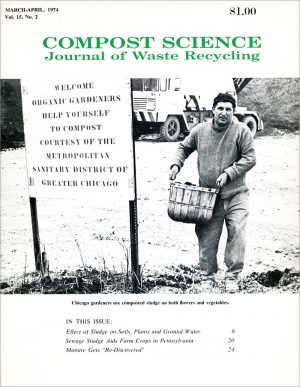
And — simultaneously with the rising costs of alternative treatment methods and fertilizer prices is the growing consciousness for a low-energy U.S. agricultural system. The same forces that demand resource recovery also demand an interrelationship between farms and cities, between food production and wastes-on-the-land, between city streets and crop rows. The issue of waste management has left the confines of the engineering department. Waste management is now interwoven within the entire fabric of our society. …The question is no longer whether the socio-economics are right for composting. Instead, it’s when our nation’s and the world’s policy-makers will make the discovery.
July-August 1979: Politics As A Compost Activator
Nine years of Composting and Recycling Conferences produce a great deal of valuable information and vivid memories. The 1979 Conference in Philadelphia May 2-4 provided both facts and memorable events.
One Conference speaker who touched upon the full range of issues to which composting relates is Mel King. Rep. King of the Massachusetts State Assembly, now a candidate to be the next mayor of Boston, sees recycling as one effective way to link the improvement of the urban physical environment to community economic development. New business opportunities exist for urban blacks and whites in the recycling field, King said, but “we need to create a system of community development corporations that can deal with the technical as well as the social and political issues.”
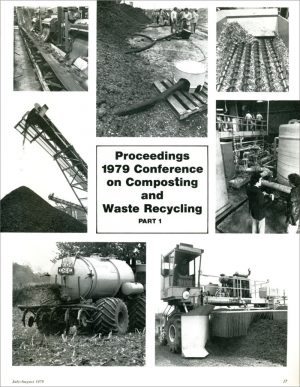 As a member of the State Assembly, King drafted the Massachusetts Farm and Garden Act which made vacant public lands available for community use. The law worked fine, except that the lots needed topsoil and what was available cost $9 to $15 per cubic yard. At that price, there clearly is a need for new businesses to make soil conditioning compost out of city wastes — and King sees a “nice little cash flow” for a few businesses and some new jobs for the unemployed. King is one of the first political leaders to call upon technological experts in the waste treatment field to integrate resource recovery into a social framework. How well we treat our garbage and sludge will always reveal much about how we treat our urban environments and our rural areas … and the people who live there.
As a member of the State Assembly, King drafted the Massachusetts Farm and Garden Act which made vacant public lands available for community use. The law worked fine, except that the lots needed topsoil and what was available cost $9 to $15 per cubic yard. At that price, there clearly is a need for new businesses to make soil conditioning compost out of city wastes — and King sees a “nice little cash flow” for a few businesses and some new jobs for the unemployed. King is one of the first political leaders to call upon technological experts in the waste treatment field to integrate resource recovery into a social framework. How well we treat our garbage and sludge will always reveal much about how we treat our urban environments and our rural areas … and the people who live there.
Compost Markets, Marketing
Autumn, 1961: How Do You Sell Compost?
Until the time when several medium to large-scale compost plants are in operation in this country, market forecasts will be difficult to prove, and the information will continue to be “inadequate.” But right now we can lay the groundwork for a successful marketing program in the future by viewing compost marketing as a job for an experienced merchandiser, not a task for a manufacturer of compost or a Public Works employee. … Marketing compost successfully as a soil conditioner and fertilizer is not so complicated to those whose job it is to launch new products.
Summer, 1963: What Would Happen If Major Fertilizer Companies Sold Compost?
What would happen, for example, if the largest fertilizer company in the United States decided to advertise a compost brand name the way Colgate pushes its toothpaste, like the Piel Brothers rave about their beer, or the way Ford sells Falcons? Just suppose, this leading fertilizer company throws caution to the wind and decides to use its full nation-wide distribution power to get the compost story across to gardeners and farmers.
Let’s for a moment look where we are now in the business of organic soil conditioners — without the help of the Number One Fertilizer Company. Here are some United States Department of Agriculture figures on fertilizer consumption for the year ended June 30, 1961:
• Compost: 24,850 tons; Dried Manures: 333,317 tons; Sewage Sludge, Activated: 85,184 tons.
• Sewage, Sludge, Other: 33,600 tons; Total of Natural Organic Materials: 526,865 tons.
• In California alone, it’s estimated that well over $500,000,000 worth of manures are sold annually for soil conditioning purposes. According to the USDA, the 300,000 tons of dry manure sold annually in California is three times the consumption of 1949.
But unfortunately the best of dreams cannot go on indefinitely. So here in 1963, it’s important to realize that despite the lack of a major fertilizer company, compost is being sold by many companies efficiently and profitably. Yes, there is a need for compost; yes, it can be sold to gardeners and farmers; but no, it’s not as simple as many would make it seem.
Autumn 1975: Borrowing Humus From The “Bank Of Organic Waste”
Agricultural economists have long accepted the rationale of borrowing money to boost crop yields. Thus, with the blessings of financial experts, farmers have gone to their local bankers for loans to buy fertilizer, tractors, pesticides, and so forth.
About the only commodity farmers have not gone into hock for is humus. And yet, according to recent research findings, soil organic matter content may be the most worthwhile “product” to borrow money for. When organic matter levels were raised 125 percent and nitrogen 180 percent after application of 10 tons/acre of natural fertilizer, corn yields jumped from 105 to 160 bushels/acre. Those results were obtained at the University of Minnesota.
Unfortunately, it will take a tremendous amount of research activity, and drastically revised policies throughout the USDA, land grant college and extension network to alter the patterns that have reduced soil organic matter levels. Borrowing humus from the “bank of organics wastes” — those produced on the farm and in the city — makes good economic sense for farmers if the wastes are:
• Consistently available at the right time and place
• Uniformly free of toxic amounts of heavy metals
• Viewed by government officials as a resource
• Considered an integral part of an agricultural program in a closed system
Future issues of Compost Science will aggressively push the value of organic matter in the soil from both an economic and environmental point of view. In our view, it’s absolutely essential to correlate developments in the composting process with soil organic matter and crop production. … There’s no doubt that we are moving in that direction. The question is why we must move so painfully slow.
October 1990: Memories Of Bob Rodale
Last week, Bob Rodale died in an auto accident in Moscow. … I worked at Rodale Press for 25 years, until we started our own company in 1978, and look back on those early days with great feeling. Bob and his father, J.I. Rodale, through the freshness of their ideas and attitudes, created a unique working environment — a place where new thoughts were welcome and nurtured, where advocacy journalism achieved new dimensions of significance.
Those of you involved with recycling issues today can get a sense of Bob’s visionary qualities by reading these concluding lines from his article in the premier issue of Compost Science in Spring 1960: “Compost is a product that in future years will be finding a greater place in the buying picture (of commercial soil conditioners and fertilizers). True, there are problems to be solved, but the fact that there is such a vast supply of raw material for the making of compost and an even greater need for the soil-building effect of compost will encourage the rapid solving of compost marketing problems.”
Federal Policies — Or Lack Thereof
May-June 1970: Everybody’s Going To Have To Pay Because It’s Their Mess
“All the exciting things are in technology, and all of the answers are in economics.”
Harold Gershowitz, executive director of the National Solid Wastes Management Association, is credited by The Wall Street Journal with the above statement which is the politest way possible of stating the obvious: If we really want to beat pollution and recycle our wastes safely and effectively, we’re all — consumer, manufacturer and taxpayer — going to have to pay for it.
The extra bill we’re going to foot may come in the form of taxes, subsidies, and just plain upped retail prices to pay for the cost of recycling the product or package involved. No wishful thinking can wash away the hard fact it’s going to cost more to recycle the wastes all of us create daily. The cost of safe disposal, extra handling and processing, hauling, converting, sorting will be paid for by the entire nation, and the sooner we get used to the idea, the better. Otherwise, we’re going to suffocate and strangle in our own wastes. This obviously must call for new laws to regulate the new marketing and cost-accounting customs.
Just such legislation is now available. We can find only good things to say about Bill H.R. 17132 recently introduced by Representative Hamilton Fish, Jr. of New York. The Republican representative’s proposal calls for the five following socio-economic measures:
• Include the cost of disposal in the price of each product, holding it in a trust fund to finance anti-pollution measures and construction.
• Develop and build a nationwide system of regional solid waste processing centers.
• Allow industries to bid for purchase of recycled materials on long-term contracts, and allow successful bidders to build their own plants at the regional centers.
• Require, where necessary, disposal bonds or deposits on automobiles and other products to assure proper disposal.
• Until the processing centers (#2) are in full operation, use part of the trust fund money (#1) to upgrade conventional disposal works. Written by Maury Franz, a Compost Science editor
January-February 1973: Toward Composting As Public Policy (or, Golly — Look What’s “Economically Sound!!!”)
Money from the “Highway Trust Fund” may soon be used to move sewage sludge onto the land where it can help grow crops. As far as anyone can tell, it will be the first time ever that such money — traditionally used to finance new interstate highways — is being used to spread organic wastes over farmland.
The reason is not that the [U.S.] Department of Transportation suddenly wants to build up the soil’s humus content. It’s simply that it has no other choice. The sewage sludge near the Philadelphia airport is in a lagoon which is blocking completion of I-95, a major interstate highway. Now that federal law prohibits ocean dumping, the sludge needs a home on the land, and the “Highway Trust Fund” will pay 90 percent of the cost to get it there.
At long last, spokesmen for a government agency have come around to a view that used to only be shared by organic gardeners and farmers. In 1973, the realities of economics, politics and organic approaches are coming together. … We have waited many, many years to read those words in a government announcement. The challenge ahead is to make certain that those words show up when public funds are spent on waste treatment methods throughout the nation.
April 1984: Seeking The Right Public-Private Blend
A survey by the National League of Cities indicated that most mayors seem to be giving up their now-traditional struggle to get more money from the Federal Government and are instead “seeking greater authority to increase their own revenues or carry out their own initiatives.” Many mayors, state and county officials predict that the decline in federal aid will continue for at least the next 20 years.
As part of an effort to come up with new solutions, many cities have created special entities to provide for services that were previously handled by general governments. The services range from transportation and parks to waste treatment. The private sector has increasingly contracted to provide services that cities could no longer afford, while in some places, service areas have been preempted by larger governments within the metropolitan area.
While some persons in-and-out of government see only virtues in shifting many responsibilities to companies through privatization, most analysts recognize the tradeoffs involved. But the long-term trend is toward a mixture of public and private sectors working together to come up with better solutions, especially when it comes to the recovery of wastes. To achieve the potential benefits from the trend will take careful thought and much cooperation, but in the end, the blend of public-private interaction would open the way to well-managed projects throughout the nation. Few expect that the way will be without its bumps and grinds.
Interconnectedness
November-December 1979: Recycling The Old Year Out … And The New Year In
There’s nothing like preparing an index of the year’s issues to remind yourself of how much has happened during the last 12 months … and then to look ahead to what’s coming up in 1980.
The diversity in editorial coverage is a direct reflection of the real world of organic waste management and renewable resources. From complex mechanical shredders and air classifiers to simple source-separation containers; from treating wastes with plants and fish to digesting manure and sludge; from controlling leachate to legislating economic incentives … there’s no way to exclude an element that can at one stage be social or political, and another time down the line, become technological. We find the diversity of topics and readership to be stimulating and challenging — and are constantly encouraged by your understanding of the unifying themes that connect people and issues we write about.
May-June 1980: The Small Business Side Of Waste Recycling
One year ago, we started publishing a companion magazine to Compost Science for people in down-to-earth small business. Titled IN BUSINESS, it is designed to be a source of ideas, know-how and support for effectively managing a human-scale enterprise.
In a recent issue of In Business, we wrote about “Entrepreneurial Ecology” — how in our own business here at The JG Press since we started over two years ago, the basic law of ecology that “everything is connected to everything else” has been proven time and time again. The more synergistic our efforts, the better our results.
Ecology is concerned with the interrelationship of organisms and their environments. Entrepreneurial ecology is concerned with the personal relationship of the owner to the business, as well as the broader implications of the business to society and the physical environment.
The smaller companies who are making great strides in the composting and recycling of organic wastes have their own special way of Managing-by-Ecology rather than by some conglomerate-type of bottom-line profit maximizing. Financial rewards are based on long-term quality, not get-rich-quick deals. There’s nothing easy about small business development, but as we look around, we’re seeing great vitality … and we’re proud to publish two magazines that can share in that vitality.
January-February 1981: A New Name For A New Era
With this issue, we have a new name — BioCycle. The reasons for the change are both internal and external. From the inside perspective, our focus has broadened measurably from the first issue in 1960 when our goal was rather simple: “Compost Science will report the technical, scientific and practical developments in the field of large-scale composting.” Over time, as we followed our editorial noses along the waste stream, we came across more and more inlets … and outlets.
The outlets, naturally enough, led us into systems and technologies that — while consistent with our editorial philosophy of serving as a clearinghouse for data on converting municipal and industrial organic wastes into useful products — were rather tenuously connected to our official name.
The name BioCycle fits well. It’s a new word, but we see no problem with that. We have entered a new era and the old ways and attitudes of dumping and incinerating are patently unfeasible and unacceptable. … The numbers of quality-managed projects, of capable manufacturers, of trained managers, of experienced engineers have risen rapidly … and we’ve only seen the beginning. Contracts are being signed, and research findings are being implemented at a rate that is warming the hearts of even the most skeptical pioneers, the ones who got so accustomed to banging their heads against rigid walls. Instead of banged-up heads, the walls are tumbling down.
March 1984: Taking The Global Perspective
Assembling the first annual international issue of BioCycle has been simultaneously enlightening and frustrating. The enlightenment, of course, follows the discovery of projects and research we scarcely knew about a few months ago. The frustration comes with the knowledge that each day new information continues to arrive from all parts of the world, and if there were more time, this issue would be even more comprehensive.
The information flow convinces us more than ever of the advances taking place in the world of BioCycling, as well as the obstacles still needed to be overcome. … Difficult as it is, there’s a great need to look at wastes and their management on a global basis. Not only will we profit from the knowledge emerging throughout the world, but global perspectives lead to a clearer understanding of the need to create resources from wastes. The global perspective can and must lead us to an ethic of waste recycling … to a commitment to implement the best waste management ideas.


